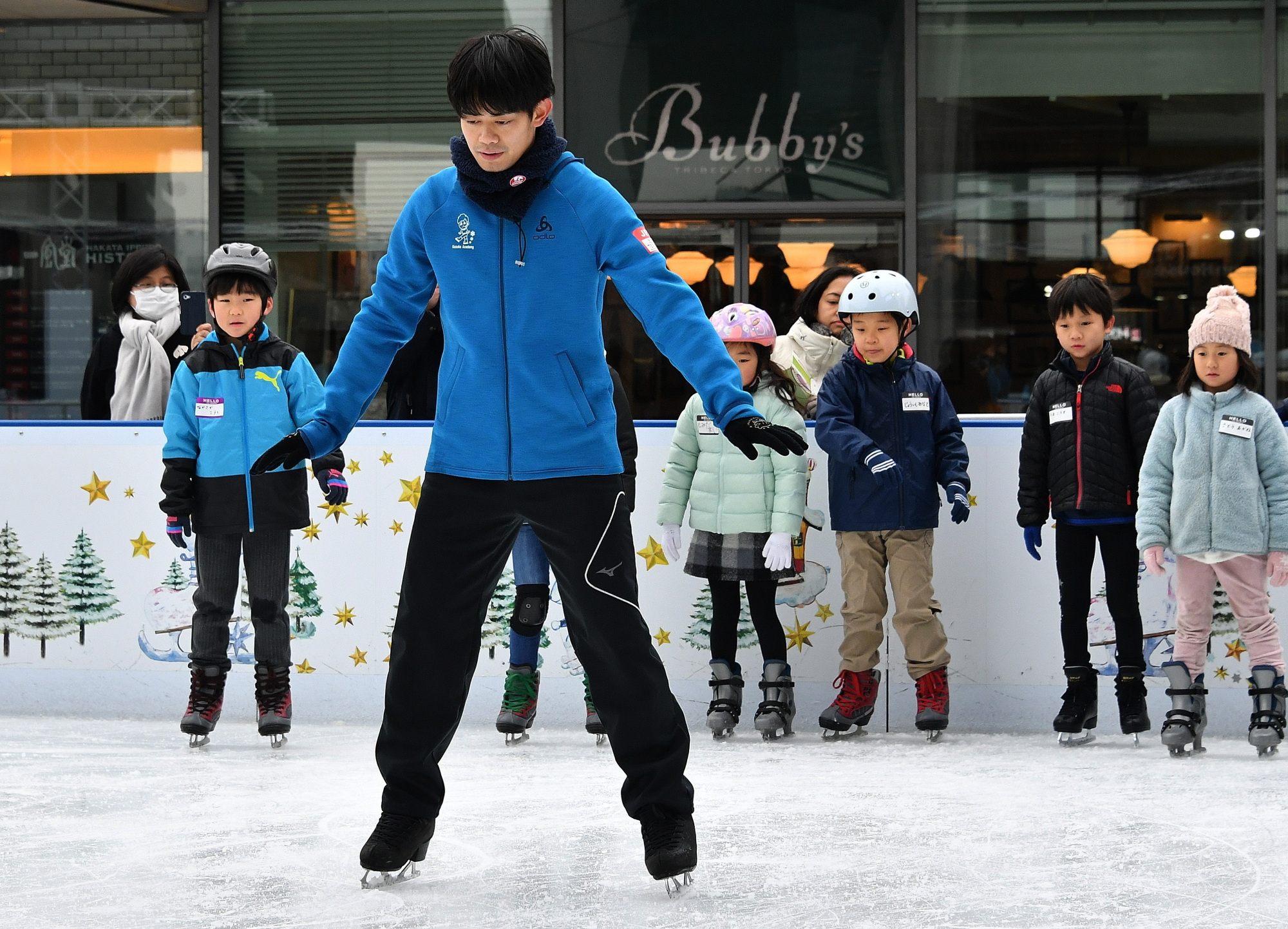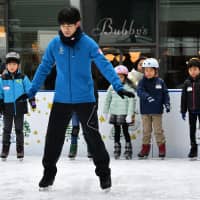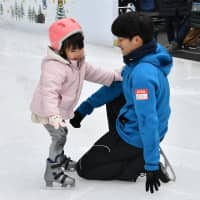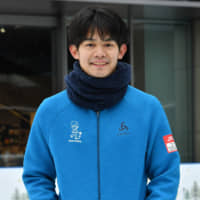When a skater's career comes to an end, they are often faced with a difficult choice about how to proceed with their life.
Some want nothing more to do with the sport, worn out by years of training and competition, some want to stay connected just on the periphery, while others will throw themselves full force into enhancing it.
Takahiko Kozuka, the 2011 world silver medalist and 2010 Olympian, is in the latter group. The Nagoya native, who will turn 30 next month, retired in 2016 after a long career that saw him win the world junior title in 2006 and earn several senior Grand Prix medals.
Kozuka literally grew up in a skating family, as his father Tsuguhiko represented Japan at the 1968 Grenoble Olympics, his mother Sachiko was an ice dancer, and two of his aunts were skaters as well.
Kozuka's grandfather Mitsuhiko was also a significant figure in the early days of skating in Japan.
For the third consecutive year, Kozuka is conducting his Kozuka Academy on weekends in Futako-Tamagawa in Tokyo, instructing both children and adults on the fundamentals of skating.
Following a recent session, Kozuka spoke to Ice Time in an exclusive interview that covered a wide range of topics, including his skating school, his creation of a special blade to help elite skaters, his thoughts on the genius of Yuzuru Hanyu and more.
"The Kozuka Skate Academy began in 2016," Kozuka noted. "At first it was it was requested by mothers to give single lessons (to their children). From this year we are doing a four-lesson plan to improve skating skills."
Kozuka, who also does skating commentary for Fuji TV, admitted he wasn't sure what the interest level would be when he launched the project (kozuka-academy.com).
"I was a bit nervous about this, but the children came so I could help them," Kozuka recalled. "Earlier this week we had a lesson for adults on a Wednesday and it sold out in 11 minutes. I would like to expand the program so more people can join, but I am unable to at this moment."
Visionary development
Kozuka, who was second at the Grand Prix Final in 2008, introduced a special high-strength skating blade last spring that was created in order to make it easier for top skaters to train. Kozuka Blades is a collaborative effort with Yamaichi Hagane Steel.
"When I was a competitive athlete, I met with Yamaichi Hagane and we started to develop it together," Kozuka stated. "I wanted it to be attentive to the needs of skaters. The blades are being made in Japan.
"Yamaichi-san originally made car engines, wings of airplanes, and molds of model kits. Like plastic models," Kozuka continued. "It's a Japanese company with Japanese quality, so we can make each blade strictly like a micron maker."
Kozuka, who skated for the Hinomaru seven times at the worlds, said frustration during training sparked the concept for the new blade.
"The idea for the blades came to me after my skate blades kept splitting or bending repeatedly while training on quadruple jumps," Kozuka commented. "This blade has solved this problem. Takahito Mura has used the blades in competition and the durability has been proven. That is one of its features."
Though it was created with the elite skaters in mind, Kozuka has made the blades available to everyone.
"I want competitive skaters to use it, but the general public of course can use it," Kozuka remarked. "Maybe people can feel the width of the blades. You can buy it through the website (kozukablades.com)."
No pressure despite legacy
Despite practically his entire family being skaters, Kozuka said he wasn't forced into the sport despite being an only child.
"With my family being so involved with skating, I didn't have time to feel pressure," Kozuka remembered. "My parents didn't force me to be a skater, but they wanted me to be what I wanted to be. I started to skate because I liked it."
Like so many before him, it was the sight of another Japanese skater competing in a global competition that sparked his interest.
"I began skating when I saw Yuka Sato win the 1994 world championships in Chiba," Kozuka stated. "One of my dreams was to be like her and skate in the Olympics and world championships.
"When I saw the 1998 Olympics in Nagano on TV, my father came home and said, 'I've been there too' and showed me his participation medal. That was when I started to think about becoming an Olympian."
Ice Time asked Kozuka if he ever thought he would see the day when Japan would become so powerful in the sport on the world stage.
"Nowadays figure skating competitions are televised in the golden time (prime time) like at 7 or 8 p.m. When I was a junior high student they were shown at midnight and only in the digest form," Kozuka commented. "At that time, nobody thought the popularity of figure skating would grow this much.
"I'm so happy because I could feel this growth when I competed as a skater and was happy to see my favorite skaters getting bigger and bigger."
I wanted to know what Kozuka thought was the reason for Hanyu's greatness.
"We can't talk about Hanyu-san with common sense. He is always overthrowing the prevailing opinion," Kozuka said. "He thinks one step ahead. He thinks about a quad axel or quintuple jump.
"He always does what he says, like becoming a two-time Olympic champion and the first in 66 years since Dick Button. He even did it with an injury, which is admirable."
May coach elite in future
Ice Time wanted to know if Kozuka envisioned himself as a full-time coach someday, traveling the junior or senior Grand Prix circuit in the future.
"I'm not thinking about coaching now," Kozuka stated. "What I learned from my parents and the Satos (Nobuo and Kumiko) was precious and I want to transmit those techniques to the next generation.
"This makes me think I must be a coach someday in the future. For now, I will teach skating to children who have never skated."
Kozuka wants to pay back the sport that has given him and his family so much.
"I want to make people go to the ice rinks to skate. Not really making people famous," Kozuka commented. "I want skating to become even more popular. I'm not thinking about growing top athletes now, just making the sport more popular."
Favorite programs
Kozuka worked with several prominent choreographers, including David Wilson, Shae-Lynn Bourne, Lori Nichol and Marina Zoueva, during his career and I wondered if he had a favorite.
"I can't decide who is my most favorite," Kozuka remarked. "Each choreographer has their own character. They watched me and extracted the best performance they could from me. I had strong feelings from each of the choreographers on the program that I worked with them on."
Ice Time then asked Kozuka to list his favorite programs. Here is what he came up with:
1. Guitar Concerto (2010 Olympics) Free Skate — Yuka Sato
2. Piano Concerto No. 1 — (2011 Worlds) Free Skate — Marina Zoueva
3. Io Ci Saro (2014-15) Free Skate — Lori Nichol
4. Take Five (2008-09) — Short Program Yuka Sato
I wanted to hear what Kozuka felt was the toughest part of being a top skater.
"The most difficult thing was not the training, because I love skating," Kozuka noted. "The mental part was tough —what I could do and couldn't do. When I had something I could not do or I had an injury, I had to be patient and think one step ahead.
"That was the toughest part, but I knew there would be pleasure after I had overcome it."
Kozuka considered Mao Asada and Daisuke Takahashi his best skating friends.
"Mao Asada was my best friend because we trained together in Nagoya and Shin-Yokohama," Kozuka said. "Daisuke Takahashi among the men."
Kozuka then told a funny story about his foreign skating friends.
"Patrick Chan and I competed against each other since we were very young," Kozuka recalled. "Charlie White used to take care of me. Patrick, Charlie and I used to eat together often. They used to translate for me — difficult English to easy English."
Having enjoyed a highly successful career, I wanted to know what Kozuka considered the pinnacle to be.
"Being an Olympian was one of the highlights of course, but moreover, the performance at the 2011 worlds is my personal highlight," Kozuka noted. "That year the big earthquake occurred and the worlds were moved from Japan to Russia. So the world, including Russia, supported Japan very much.
"In that circumstance I was able to do that performance. As a skater I was supported by many people, but at that time I could return the favor to the supporters."
I inquired about Kozuka's thoughts on seeing his former competitors like Takahashi and Sergei Voronov still going strong in their 30s.
"It is amazing watching these skaters," Kozuka commented. "The mental part of having to do the same thing again and again and endure the training is really something, especially Daisuke Takahashi has come back to training by his own wishes."
How about the junior Russian girls landing quads?
"It's like when skaters like Nathan Chen, Yuzuru or Shoma (Uno) started jumping not just quad toe loops or salchows, but also flips or lutz," Kozuka stated. "Skaters realized they could do it or try to do it when they saw another skater do it.
"The achievements and seeds of what Midori Ito, Yukari Nakano and Mao Asada have done with the triple axel is now blooming (in younger skaters)," Kozuka explained. "When I see the young Russian skaters doing quad jumps, I think, 'Why did I struggle with quad jumps?' "
Kozuka also gave Ice Time his thoughts about Rika Kihira's quick rise in her first year as a senior.
"I have heard about her doing the triple axel and quads since she was little, and it seems like she is really blossoming this season," Kozuka said. "But she has the potential to do much better. She will get high scores, but I look forward to her performances going forward."
Kozuka cited the burden of cost on elite skaters when I asked him about the challenges facing those at the top.
"Having parents who were skaters, they could point out when I was being lazy, but they could also understand my feelings and I thank them for that," Kozuka commented. "The most difficult part of being a competitive skater is the cost. It is expensive to be a competitive skater.
"If you succeed, you have can sponsors that support you and you can return the favor to your parents," Kozuka continued. "I'm fortunate that my parents were patient until I got sponsors.
"But I don't want people to think that skating is expensive. It is only so if you become an elite athlete. I want people to enjoy skating in my lessons or anywhere on ice rinks."
Ice Time concluded by wondering what advice Kozuka would give to young skaters who want to reach the heights that he did.
"Enjoy skating," Kozuka replied. "There will be tough times as a competitive skater, but there should be friends supporting each other and cheering you up. I want the young skaters to have their own goals with a smile."





















With your current subscription plan you can comment on stories. However, before writing your first comment, please create a display name in the Profile section of your subscriber account page.